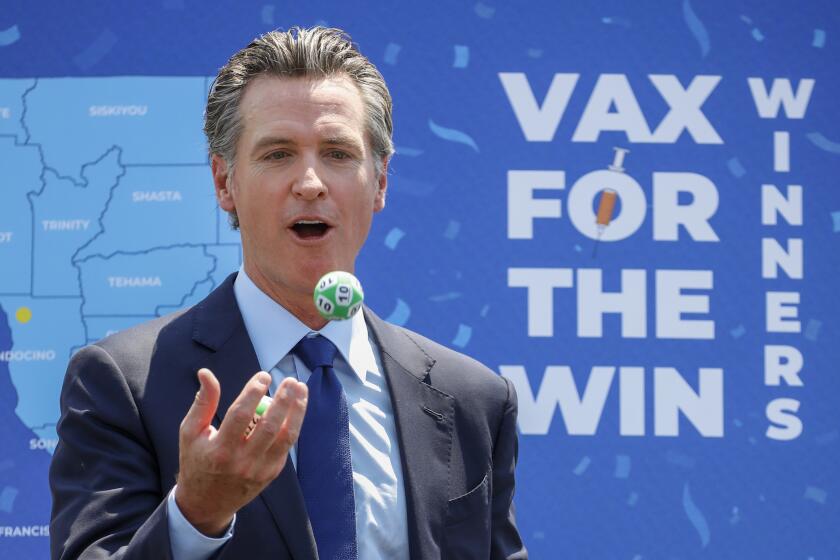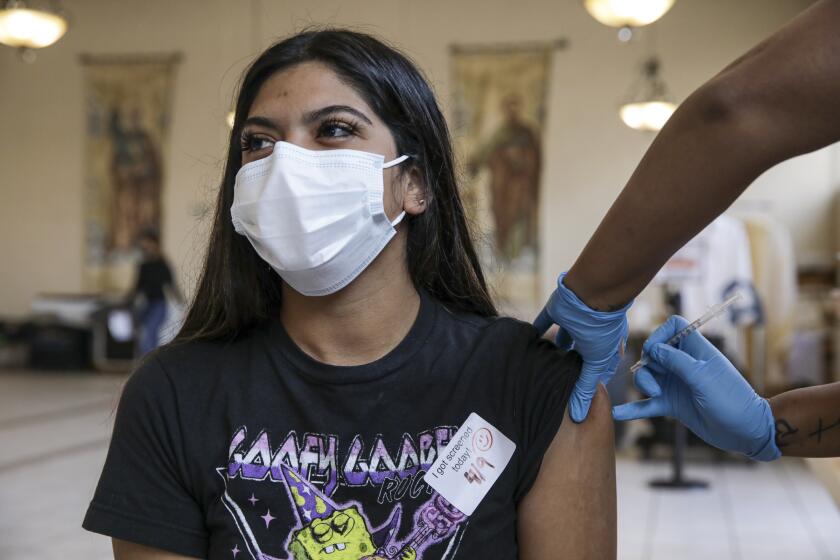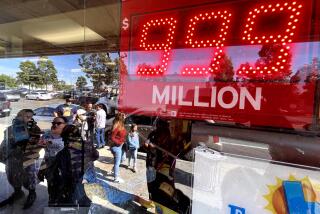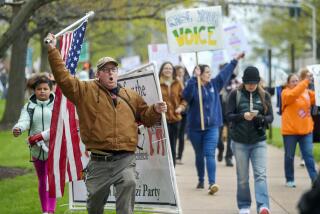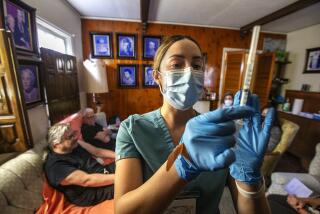Ohio, vaccine lottery pioneer, ends program without hitting 50% vaccination mark
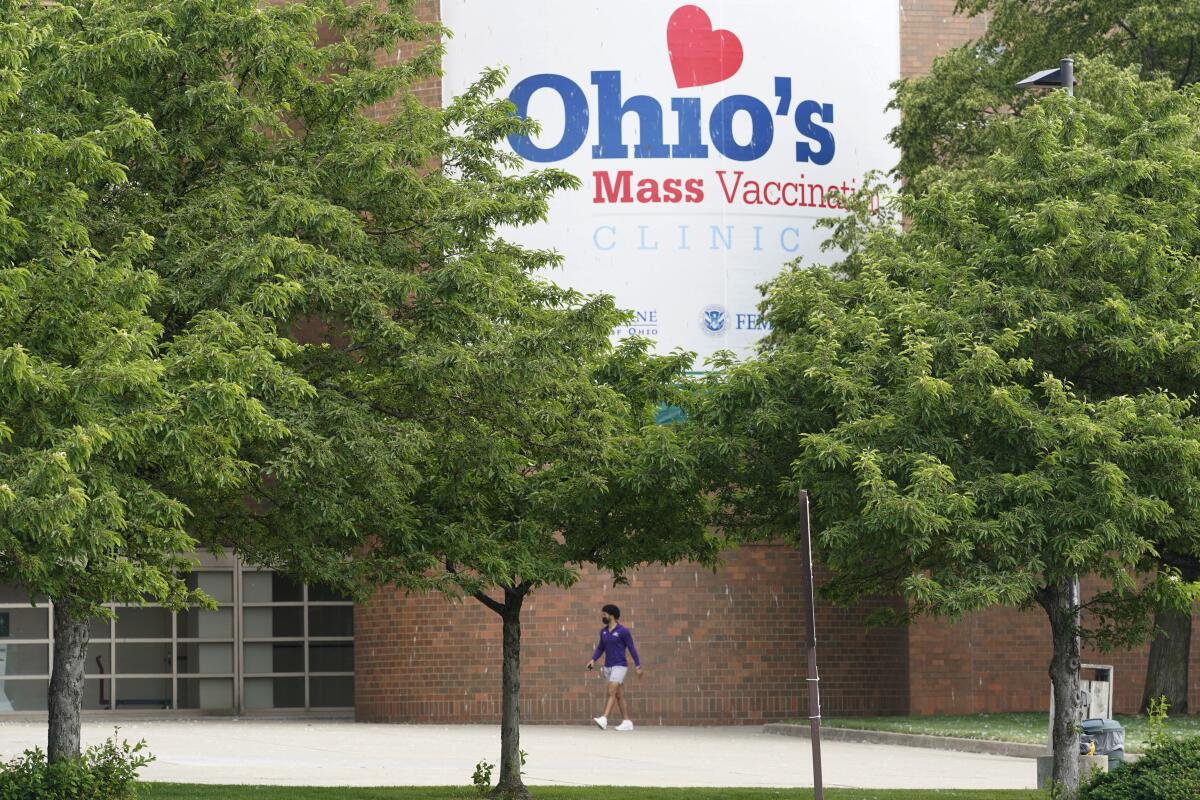
- Share via
COLUMBUS, Ohio — Ohio, the state that launched the national movement to offer millions of dollars in incentives to boost vaccination rates, concluded its lottery program Wednesday without succeeding in cracking the 50% vaccination mark.
Republican Gov. Mike DeWine’s announcement of the incentive program May 12 had the desired effect of boosting the state’s COVID-19 vaccination numbers by 43% over the previous week. But the vaccination rate has dropped since then.
“Clearly the impact went down after that second week,” DeWine acknowledged Wednesday.
Ohio is not alone in achieving mixed results for prize-giving. Multiple states followed Ohio’s lead, including California, Louisiana, Maryland and New York, with the impact on vaccinations hard to pin down. In California, some experts suggest that the state’s $116.5-million incentive program did spark increased interest in COVID-19 shots.
Under New Mexico’s “Vax 2 the Max” sweepstakes program, vaccinated residents could win prizes from a pool totaling $10 million. The rewards include a $5-million grand prize that will be drawn later this summer. The sweepstakes kept the vaccination rate from declining further, but the initial boost was small. According to the governor’s office, the seven-day average of new vaccination registrations was 1,437 per day during the first week of the contest — just 85 more per day than the previous week.
In West Virginia, Republican Gov. Jim Justice hoped to use a series of prize giveaways to inject new life into a vaccine drive that drastically slowed down after a strong early start.
Though it is impossible to say for sure, some suggest the state’s $116.5-million incentive program probably sparked renewed interest in getting a shot.
When he announced the drawings last month, Justice projected that more than two-thirds of eligible residents age 12 and over would be inoculated by the time he lifted a mask mandate Sunday. But the state fell short of that goal: Only 61.5% had received at least one dose by Sunday’s first drawing.
In late May, Democratic Gov. Kate Brown of Oregon announced that residents 18 or older who had received at least a first dose of COVID-19 vaccine would automatically be entered to win $1 million or one of 36 cash prizes of $10,000, with one winner in each county. Oregonians age 12 to 17 have a chance to win one of five $100,000 scholarships. The drawing is set to take place Monday.
The Oregonian reported in early June that, nearly two weeks after Brown’s lottery announcement, the seven-day average of adults receiving their first shots actually fell from about 9,000 to 6,700.
This month, Brown announced additional prizes, including travel packages to destinations around Oregon and more than 1,500 gift cards, worth $100, that were distributed at vaccine sites during the June 12 weekend — an incentive that officials said did bring a noticeable increase of people to vaccination sites.
It turns out that what really motivates people is the chance to strike it rich. What could be more American than that?
In Colorado, inoculations have slowed since its lottery was rolled out by Democratic Gov. Jared Polis last month, with about 589,000 fewer doses given out in the month after Polis’ announcement compared to the month before.
The state is offering five residents the chance to win $1 million each in weekly lottery drawings from June 4 until July 7.
In Ohio, about 5.5 million people have received at least one shot of the Pfizer, Moderna or Johnson & Johnson COVID-19 vaccines as of Wednesday, or about 47% of the population. About 5 million people, or 43% of the population, have completed the process with second doses where applicable.
While the incentive’s success was short-lived, it got Ohioans who were either on the fence or who had shunned the shots to go and get vaccinated, DeWine said.
As evidence, Jonathan Carlyle of Toledo, an Amazon delivery driver who won the second $1-million prize June 2, said the next day: “When y’all announced the Vax-a-Million, as soon as I heard that, I was like ‘Yes, I need to go do this now.’”
The state announced its final winners Wednesday, with Esperanza Diaz of Cincinnati getting the $1-million prize and Sydney Daum of Brecksville, in Cuyahoga County, winning the full-ride scholarship.
More to Read
Sign up for Essential California
The most important California stories and recommendations in your inbox every morning.
You may occasionally receive promotional content from the Los Angeles Times.
